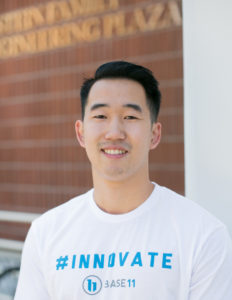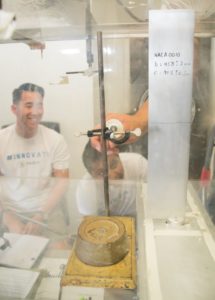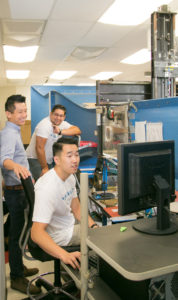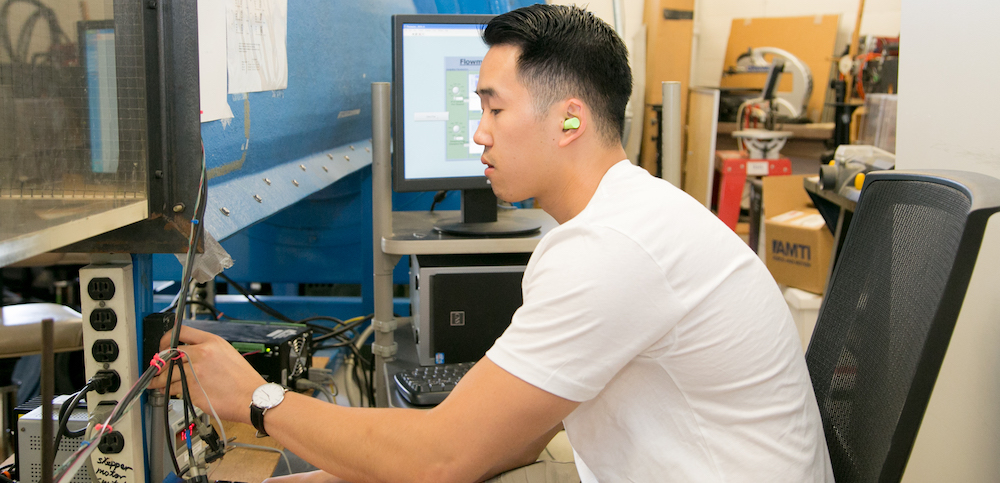Philip Chan was a student at East Los Angeles College when he was selected for a Base 11’s summer engineering fellowship at the University of Southern California. He is now a student at the University of California, Riverside. Here, he shares the what he discovered about STEM research through his summer engineering experience at USC.

Philip Chan, Base 11 Fellow
As a community college student, I often heard my peers in STEM classes talking about “research.” But it was not until my third year at East Los Angeles College that I learned that friends of mine in the MESA program had actually done summer research. I talked to a few of them and they told me how rewarding their experiences were and also how doing research boosts your resumé. On top of that, they all mentioned how vital research is if I ever wanted to pursue graduate studies.
So, I decided to further investigate undergraduate research and once I realized how important it is to get research experience, I decided to apply for summer fellowships, including one at USC, through Base 11.
What really appealed to me about the USC fellowship was how clear their application was and the research tasks they expected us to complete. Also, their topic of research was unmanned air vehicles, which involved wind tunnel testing — something technical that stood out as what interests me about engineering.
Here are a few things I learned from my summer engineering experience at USC.
Research has no answer key

Philip and his team used weights to measure drag on the small wing in the wind tunnel.
First, I noticed some key differences between school and research. In your STEM college courses, you usually attend a lecture where your professor goes over the materials, explains concepts, and works out a few examples. You will end up tackling similar problems on your homework based on your lecture and eventually be tested on it.
But in research, you are trying to figure out problems without the help of a lecture. You must go out of your way to find materials and sources to back up your research idea. This involves reading plenty of books, articles and research papers related to your topic. There is no straight-forward direction to go in your research and no exact answers to what you are researching. Furthermore, the research process is not completed in a day but rather weeks, months or even years. That’s because in research, there is always something to improve on such as the precision and confidences of your results.
At USC, my teammates Francisco, Hugo, and I were trying to determine whether the software XFLR5 (an aerodynamic simulation program) can determine lift and drag characteristics at Reynolds Numbers below 200,000. In other words, we are testing airfoil at speeds below 30 m/s. To compare our results, we tested the NACA0010 airfoil in the USC Biegler Hall wind tunnel to determine whether our experimental data followed the same trend as the results from the XFLR5 program. My team spent countless hours in the wind tunnel recording results because we want to be confident with every single point we analyze to prove whether the program works or not. Finding the answer was entirely up to us.
Mentors make a huge difference

Dr. Wilson Chan, left, mentors Philip and Frankie (back) as they run experiments in the wind tunnel.
As a team of students from different community colleges, Hugo, Francisco and I were nervous to be conducting research at a prestigious university like USC. We were fortunate to have Prof. Wilson Chan and graduate students, Joe, Tyler, Geoff and Dennis, as our mentors. One of the biggest surprises to me was how helpful and supportive our mentors were at USC. Whenever we had a question or a potential solution to a problem, our mentors were easy to contact and gave us great feedback.
Factor in extra time
The hardest challenge was understanding the time limits we had with our schedules. We tried to do too much and forgot to factor in time for breaks and testing errors, which sort of overwhelmed us. So I highly recommend that if you are doing research, give yourself a deadline for each week – and plan to give yourself time for breaks! If you’re in the lab for too long, your fatigue might cause you to make a mistake with your experiment.
Nothing compares to first-hand experience
The best part of doing summer research at USC was the experience. The opportunity to take part in a research at USC and also live on campus was so memorable. I was able to bond with my team as well as our mentors outside of the lab. For instance, we had a bonding day starting off with lunch and ended it with a few games of basketball against some of our mentors. After completing the fellowship with a formal research presentation, I felt more ready to transfer to UC Riverside. I strongly believe everything I learned over the summer such as technical skills, teamwork and soft skills allowed me to be more prepare to be successful at UCR.
Completing summer research at USC was such an amazing experience. Before experiencing research first-hand, I was hesitant about pursuing graduate studies. Now, going to graduate school is definitely a possibility for me. My plan from here is to attain a corporate internship next summer and decide whether graduate school is for me.

